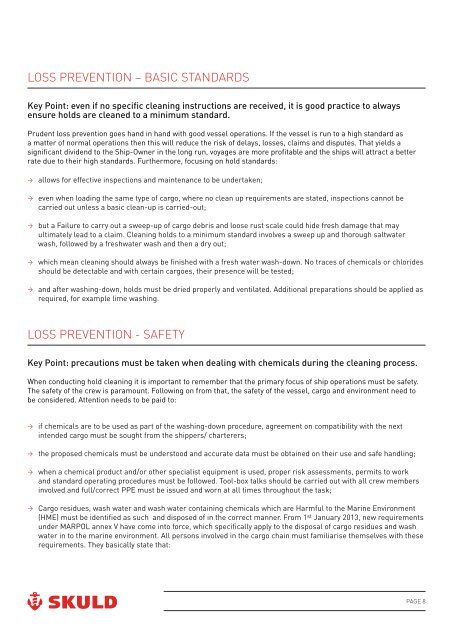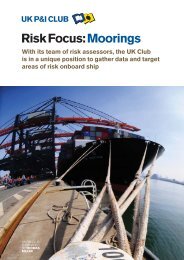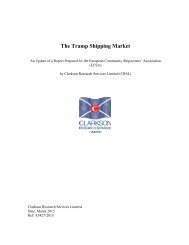Preparing cargo holds_ Loading solid bulk cargoes
Preparing cargo holds_ Loading solid bulk cargoes
Preparing cargo holds_ Loading solid bulk cargoes
Create successful ePaper yourself
Turn your PDF publications into a flip-book with our unique Google optimized e-Paper software.
LOSS PREVENTION – BASIC STANDARDS<br />
Key Point: even if no specific cleaning instructions are received, it is good practice to always<br />
ensure <strong>holds</strong> are cleaned to a minimum standard.<br />
Prudent loss prevention goes hand in hand with good vessel operations. If the vessel is run to a high standard as<br />
a matter of normal operations then this will reduce the risk of delays, losses, claims and disputes. That yields a<br />
significant dividend to the Ship-Owner in the long run, voyages are more profitable and the ships will attract a better<br />
rate due to their high standards. Furthermore, focusing on hold standards:<br />
´ ´ allows for effective inspections and maintenance to be undertaken;<br />
´ ´ even when loading the same type of <strong>cargo</strong>, where no clean up requirements are stated, inspections cannot be<br />
carried out unless a basic clean-up is carried-out;<br />
´ ´ but a Failure to carry out a sweep-up of <strong>cargo</strong> debris and loose rust scale could hide fresh damage that may<br />
ultimately lead to a claim. Cleaning <strong>holds</strong> to a minimum standard involves a sweep up and thorough saltwater<br />
wash, followed by a freshwater wash and then a dry out;<br />
´ ´ which mean cleaning should always be finished with a fresh water wash-down. No traces of chemicals or chlorides<br />
should be detectable and with certain <strong>cargo</strong>es, their presence will be tested;<br />
´ ´ and after washing-down, <strong>holds</strong> must be dried properly and ventilated. Additional preparations should be applied as<br />
required, for example lime washing.<br />
LOSS PREVENTION - SAFETY<br />
Key Point: precautions must be taken when dealing with chemicals during the cleaning process.<br />
When conducting hold cleaning it is important to remember that the primary focus of ship operations must be safety.<br />
The safety of the crew is paramount. Following on from that, the safety of the vessel, <strong>cargo</strong> and environment need to<br />
be considered. Attention needs to be paid to:<br />
´ ´ if chemicals are to be used as part of the washing-down procedure, agreement on compatibility with the next<br />
intended <strong>cargo</strong> must be sought from the shippers/ charterers;<br />
´ ´ the proposed chemicals must be understood and accurate data must be obtained on their use and safe handling;<br />
´ ´ when a chemical product and/or other specialist equipment is used, proper risk assessments, permits to work<br />
and standard operating procedures must be followed. Tool-box talks should be carried out with all crew members<br />
involved and full/correct PPE must be issued and worn at all times throughout the task;<br />
´ ´ Cargo residues, wash water and wash water containing chemicals which are Harmful to the Marine Environment<br />
(HME) must be identified as such and disposed of in the correct manner. From 1 st January 2013, new requirements<br />
under MARPOL annex V have come into force, which specifically apply to the disposal of <strong>cargo</strong> residues and wash<br />
water in to the marine environment. All persons involved in the <strong>cargo</strong> chain must familiarise themselves with these<br />
requirements. They basically state that:<br />
PAGE 8




